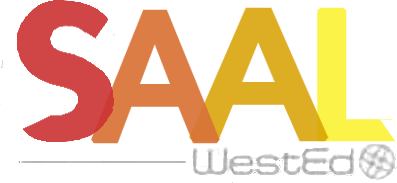Formative Assessment Grant Projects
Previous Grant Projects
WestEd’s Student Agency in Learning (SAIL) digital learning model is based on the premise that teachers support the development of student agency through developing expertise and continuously attending to three interrelat-ed constructs: formative assessment practice, classroom culture, and student identity. Formative assessment, particularly student-led practices such as peer feedback and self-assessment, provides a framework through which teachers can support their students to take ownership over their own learning. A classroom learning culture, in which students are free to explore new ideas, share what they know, support one another’s learning, and express what they do not yet understand, creates the safe space for student growth. Student identity grounds this work, as teachers identify ways for each individual student to try on new roles, be known as capable learners and knowers, develop and share their unique individual interests, and bring their prior knowledge and culture to the learning community.The Arizona Department of Education along with partners WestEd and Margaret Heritage, have been involved in multiple projects with difference points of focus on Formative Assessment. This site provides resources and an overview of the past and current projects that Arizona Educators, the ADE, and WestEd have partnered together to positively influence student achievement.
The Formative Assessment Insights course is an interactive digital learning experience for teachers in grads K-12. This is an interactive digital learning experience for teachers in grades K-12. The interactive platform provides teachers opportunities to learn with like- minded colleagues in their own school and districts around the country. When teachers implement formative assessment as a process, in collaboration with their students, it can have powerful effects on student learning. His online course has 5-6 modules and runs approximately 6 months for completion. Participants can take the course individually or as a group. This course can be purchased and implemented at a school/district level. For additional information please visit the WestEd website on FAI.The FAST-ER Grant is focused on different models of formative assessment implementation based on the needs of each site/district involved in the project. The main tool of the grant is Using the Formative Assessment Rubrics, Reflection and Observation Tools to Support Professional Reflection on Practice or FARROP. Implementation of a self-reflection and peer reflection model using the FARROP rubrics is the main focus of the grant. Participants spent the school year extending their learning about formative assessment and the FARROP rubrics through online modules focused on the 10 dimensions of formative assessment, videotaping their own classroom for self-reflection, and through observing other teachers and assisting them in their growth of implementation of formative assessment. For additional resources on FARROP and access to the online training modules, please click on the Professional Learning Resources tab.
The SAAL project is focused on giving students the capabilities to learn for themselves. This project built upon what teacher participants had already learned through the Formative Assessments Insights (FAI) course by exploring the competencies that contribute to students becoming active agents in their own learning and assessment. For additional information please visit the WestEd website on SAAL.
Additional Research
Connecting Formative Assessment Research to Practice – An Introductory Guide for Educators (2009) The Connecting Research to Practice brief is intended to enhance the knowledge and build the capacity of state, district and school personnel to implement effective formative assessment practice. The brief defines formative assessment, examines the research, and outlines the components needed to develop a high-quality, research-based formative assessment plan in a state, district or school. Formative Assessment: An enabler of learning (Heritage, 2011) (link file Formative Assessment Article) This two-page article provides a great starting o point and foundational information about the process of formative assessment. This article supports the definition of formative assessment as a process and outlines the teacher’s role, the student’s role, feedback and classroom climate as critical parts of the formative assessment process.










